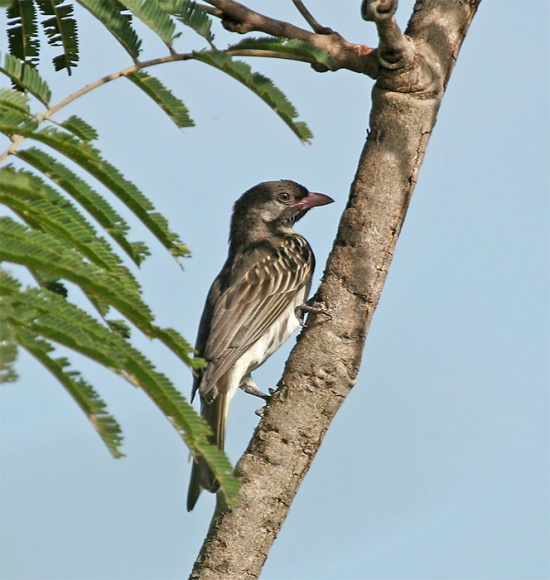- Indicator indicator
Identification
20 cm. Sexually dimorphic
Male: forehead to mantle dark olive brown, rump and uppertail coverts white with broad, dark shaft streaks. Lores black with a short, black eyestripe. White ear coverts. chin, throat and extreme upper breast black. Rest of underparts greyish washed white with faint streaks on rear flanks. Wings black with narrow white margins. Tail, centre feathers black, outers white with broad black terminal band. Eye black, bill bright pink, legs black.
Female: as male except for dusky lores, ear coverts washed greyish olive brown, no black bib, smaller pale rump and bill black.
Distribution
Widespread throughout Africa, south of the Sahara:
Western Africa: Mauritania, Senegambia, Senegal, The Gambia, Guinea-Bissau, Guinea, Mali, Sierra Leone, Liberia, Ivory Coast, Ghana, Togo, Benin, Nigeria, Niger, Chad, Cameroon, Central African Republic, Equatorial Guinea, Gabon, Congo, Democratic Republic of Congo, Angola
Eastern Africa: Sudan, Eritrea, Ethiopia, Somalia, Kenya, Uganda, Rwanda, Burundi, Tanzania, Zambia, Mozambique, Malawi
Southern Africa: Namibia, Botswana, Zimbabwe, South Africa, KwaZulu-Natal, Lesotho, eSwatini
Taxonomy
This is a monotypic species[1].
Habitat
Areas with tall scattered trees.
Behaviour
Diet
Their diet consists of honeybee grubs, eggs and beeswax; also insects, termites and flying ants and flies etc.
Vocalisation
Call: loud, ringing 2 note call with the same rythm as "victor" and loud rattle used as a guiding call for Ratels (and humans) to bees nests.
References
- Clements, J. F., T. S. Schulenberg, M. J. Iliff, D. Roberson, T. A. Fredericks, B. L. Sullivan, and C. L. Wood. 2014. The eBird/Clements checklist of birds of the world: Version 6.9., with updates to August 2014. Downloaded from http://www.birds.cornell.edu/clementschecklist/download/
- Avibase
- Handbook of the Birds of the World Alive (retrieved August 2014)
Recommended Citation
- BirdForum Opus contributors. (2025) Greater Honeyguide. In: BirdForum, the forum for wild birds and birding. Retrieved 22 April 2025 from https://www.birdforum.net/opus/Greater_Honeyguide






